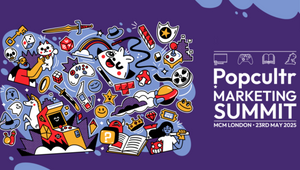
Inside the Agency Redefining Pop Culture Marketing

Like most great origin stories, Experience12’s journey began with an unexpected twist. In the summer of 2012, founder Chris Whittle found himself at a crossroads. Having been made redundant from his role at agency, Beatwax, he was at loose end, interviewing for senior experiential roles but feeling totally uninspired. “Never one to shirk a challenge (or just plain stubborn), I decided to start an agency that I could pour my heart and soul into,” he tells me. What followed was a bootstrapped, independent venture, built from the ground up without investors.
Today, 12 years later, Experience12 is a global leader in pop culture marketing, with a loyal team that has remained the backbone of its success.
But simply ‘existing’ in the increasingly crowded agency world wasn’t enough. As the media landscape evolved, so too did Experience12’s vision. “We saw our scope as wider than the traditional definition of entertainment,” Chris explains. Through deep research and client conversations, the agency spotted a crucial shift: fandoms were changing, and their consumption of media was evolving at lightning speed. This led to the agency defining itself as a specialist in ‘Pop Culture Marketing,’ positioning itself as an expert in working with narrative properties – from games to TV, film, and consumer products.
“We were already here – independent, nimble, responsive, and we 100% know what we’re talking about,” he says, reflecting on the increasing ‘gold rush’ of agencies now attempting to tap into this market.
The War for Attention and Understanding Fan Behaviour
With years of data collected from major conventions like MCM London Comic Con and NYCC, Experience12 has built a keen understanding of how fans engage with content. One of the biggest changes has been in how fans discover new releases. “We’ve seen a huge move away from traditional media channels onto social, and from what we can see, it’s on the move again – to closed social networks and the obvious move away from social ads to creator and influencer content,” says Chris. The challenge is an evermore fragmenting audience. “We characterise this as ‘the war for attention,’” he explains, referencing a talk the agency gave at UK House at SXSW in 2022.
At its core, pop culture marketing remains rooted in word-of-mouth. “Generating word-of-mouth is marketing 101,” says Chris. “Fans and fandoms are that network; you just need to look after and engage them.” But that engagement isn’t just digital – it’s physical, too. “Bringing those fans together or going to where they congregate in real life is and will still be the best way to generate momentum and impact for the foreseeable future. It’s also the only way to counteract increasing digital blindness.”
The agency’s insights show an undeniable trend: gaming and anime have taken centre-stage in fan culture. “The rise has been fascinating to watch,” says Chris. “Anime was almost invisible to the mainstream consumer for years, but it’s all changed now. This generation of fans is looking to the East as much as, if not more so, than the West for their pop culture passions.”
The same pivot has occurred in gaming. “The games industry has traditionally seen its culture as siloed away from mainstream culture,” he explains. But that’s no longer the case. “91% of fans in the latest set of data regularly play video games of some sort. In the perpetual search for new IP and how to monetise existing IP, games have now become culturally mainstream by any measure.” For Experience12, understanding these contextual backdrops means knowing how to position brands authentically in these spaces – something many brands struggle to navigate.
The Power of Live Events
While digital engagement is crucial, Experience12 remains adamant that in-person events are irreplaceable. “Most importantly, go where the fans are IRL,” says Chris. “There are both tangible and intangible benefits to face-to-face engagement.” At industry events, he challenges scepticism around ROI from live experiences, countering with a simple argument: “If events don’t work, then why are you here?”
Conventions like MCM London Comic Con provide a unique opportunity: “Fan events have the most passionate people, who consider themselves to be influential in their wider circle. Big fan events deliver the footfall and engagement numbers you’d be looking for in a national mall tour or a major festival site.”
Experience12’s approach is simple: “To engage to convert, go to large events. To empower and amplify, create or support your community online and IRL.” But as Chris points out, brands often misunderstand their audience’s loyalty. “We can’t count the number of times we’ve been told by a client, ‘We don’t need to attend that event; they’ll support us whether we’re there or not.’ With the fragmentation of content and the war for attention, that’s no longer true.”
“Conventions are an important part of Experience12’s work, but their reach also encompasses experiential, press, influencer, and community events all around the world, for all sizes of clients. “We love to work with early-stage as well as established clients,” Chris says. "There’s something particularly special about working with a client who is growing and helping to guide and support them in that journey using the same outlook we use for our larger clients. One of our longest-standing clients was launched the same year as the agency, and it’s great to have grown up together.”
One of Experience12’s latest initiatives is the Pop Culture Marketing Summit, born out of a frustration with the lack of industry-wide conversation. “As an agency, we’ve got this habit of asking questions, doing some research, not being satisfied with the answers, and then deciding to do something about it ourselves,” Chris explains.
The summit offers a space for brands and marketers to share insights and experiences. “The challenges facing the clients and everyone working in the sector are nuanced but similar,” he explains. “There’s nowhere for all these people on the front lines to get together and listen to their peers – so we created that opportunity.”
With the 2024 edition proving the concept, the 2025 summit is set to expand, giving marketers the tools and connections to navigate an increasingly complex industry.
Global Expansion
As Experience12 looks to the future, its global ambitions remain key. “We’ve always set out to be a global agency,” Chris tells me. “We’ve invested and worked very hard over the years to build the networks and connections to deliver with confidence all around the world.” The agency has been deeply involved in international trade initiatives, participating in UK Advertising Export Group (UKAEG) missions and Department of Business and Trade events like SXSW and GDC. “Engagement with UKAEG has been pivotal,” he adds. “It presents opportunities and broadens the horizon of the agency’s confidence and aspirations.”
But adapting to the future isn’t without its challenges. “In a world where there is so much content congestion and noise, you’re in a battle for an audience’s time. The industry has driven for ROI efficiency using hyper-targeted social and influencer as its main spend. But that’s why you sometimes don’t realise a new season of a show you enjoy has dropped – you’re not in that small segment that’s being targeted.”
His advice to brands is simple: “Be authentic. That’s it. That’s the secret sauce.”
With a decade of experience, a deep understanding of fan behaviour, and a passion for innovation, Experience12 is shaping the industry from within. “We want to be a competitor in the biggest pond we can,” says Chris. “It allows us more scope to grow and do the work that we want to be doing.”
In a world where brands constantly fight for attention, Experience12 has positioned itself as the bridge between fandom and marketing. By staying agile, deeply connected to its audience, and unapologetically authentic, it is proving that the future of brand engagement isn’t about selling – it’s about belonging.















